
No. 7, 2025 | 5 June 2025
Go to:
From FRSA's Executive Director
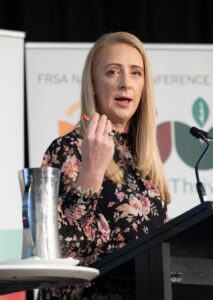
This morning, I met with my co-members on the FRSA Reconciliation Action Plan Working Group, which includes FRSA Board Directors, Cheryl Orr (Chair), Graeme Westaway and Felicity Williams, and FRSA’s Manager of Policy and Research, Robyn Clough. At the end of Reconciliation Week, it was certainly a fit and apt time for us to meet as the Working Group to discuss ideas and aspirations for our next Reconciliation Action Plan (RAP) – Innovate. As an organisation with a Board of Governance our RAP provides a roadmap to keep us on track and accountable for our reconciliation commitments and our vision for an Australia in which Aboriginal and Torres Strait Islander children, families and communities are safe, recognised, respected and valued.
Looking back on our last RAP, FRSA is proud of our efforts in promoting and highlighting the outstanding work with and involving First Nations people through the FRSA network. It is also great to see the ways in which our membership has been celebrating National Reconciliation Week in the member news section of this eBulletin.
If you were at the FRSA Conference in May this year I hope you managed to catch the keynote presentation from National Commissioner Lil Gordon, Acting National Commissioner for Aboriginal and Torres Strait Islander Children and Young People. What a passionate, energetic and aspirational advocate she is for ensuring better futures and outcomes for First Nations young ones. Part of her message was also one of Reconciliation and journeying with mainstream organisations and we look forward to continuing to walk that path.
The Conference! There has been overwhelming feedback from our Conference delegates that this year delivered the best conference yet! My sincere thanks to Stuart McMinn for his warm Welcome to Country and for helping us to embed First Nations culturally appropriate and sensitive activities throughout the Conference. It was a bit of a coup to secure the new Minister for Social Services, the Hon Tanya Plibersek in her first 6 or 7 days in office and it was heartening to hear her say that in being appointed the Minister for Social Services she felt ‘she had come home’. What an amazing start! We were able to feature outstanding keynote speakers such as Commissioner Gordon; Professor Sharon Bessell, DSS Deputy Secretary; Letitia Hope, Judge Thomas Altobelli; the Hon John Faulks; and NSW Australian of the Year finalist, Kath Koschel, as well as deliver an aspirational and inspirational young people’s panel featuring Victorian Flanagan as Moderator with Greg Kennedy, Kimeaka Bermingham, Lachlan Hobman and Rachel Perinparajah. And, of course, I must mention the 70 concurrent sessions including 5 symposiums featuring and showcasing the exceptional work in the sector. Looking back, no wonder we were all exhausted by the end! I have been delighted to hear sector CEOs and managers consistently telling me their staff have returned to work after conference reinvigorated, inspired and motivated – so, in my eyes, a success all round!
At the moment we are working hard behind the scenes to deliver as much of the Conference content as we can to you in the form of session slides, photos and videos of the keynote speakers and panels. This is a bit of a work in progress that we are adding to each day so, please be sure to keep coming back to the Conference website to stay up to date. And – don’t miss the write up below.
Kind regards,
Jackie Brady
FRSA Executive Director
The FRSA National Conference 2025 – Safe, Strong & Thriving
On 19-22 May 2025, FRSA held its annual National Conference at Sheraton Grand Sydney Hyde Park on the lands of the Gadigal people.
It is always a pleasure to bring the sector together to share research, practice learnings and insights and we were thrilled to have close to 600 delegates join us for this year’s conference. Practitioners, academics and policy makers working to support children, families and communities came together to identify the strengths we can build on and the opportunities we can harness to meet the changing needs of children, families and communities.
The week started with four well subscribed pre-Conference workshops:
- Cultural Frameworks and Embedding Them into Professional Practice (Facilitated by Stuart McMinn, Gawura Cultural Immersions)
- Communities for Children Facilitating Partner (CfC FP) Workshop
- Family Law Workshop
- Survey success: Simplifying data collection for maximum impact (facilitated by the Australian Institute of Family Studies and the Parenting Research Centre).
On Tuesday 20 May we were honoured to have proud Dharug and Gubbi Gubbi man, Stuart McMinn, Welcome us to Country. Prior to establishing his own business – Gawura Cultural Immersions – Stuart worked in the family and relationship services sector for many years which made his Welcome particularly special.
We were delighted and privileged to have the newly appointed Minister for Social Services, the Hon Tanya Plibersek MP, deliver a welcome address. Minister Plibersek reflected that her ministerial appointment to social services ‘felt like coming home’. We look forward to working with Minister Plibersek over this parliamentary term. The Minister’s address was complemented by a departmental address from Letitia Hope, Deputy Secretary, Department of Social Services later in the morning.
It was also a great privilege to have Lil Gordon join us to deliver a keynote address. Lil is the inaugural Acting National Commissioner for Aboriginal and Torres Strait Islander Children & Young People. Lil’s reframing of ‘early intervention’ as ‘early opportunity’ was testament to her ongoing focus on strengths-based thinking and approaches in social policy and support.
Professor Sharon Bessell’s keynote address – Delivering More for Children – and Families – emphasised the value and importance of asking children directly what matters most to them in building strong and inclusive communities and addressing poverty. Sharon’s presentation was the perfect segue way into our panel discussion – How listening to the voices of young adults can deliver positive impacts for children and young people accessing your services – and a video clip on Uniting NSW.ACT’s work with their Youth Advisory Committee.
Panellists included:
- Greg Kennedy – Uniting Counselling & Mediation
- Kimeaka Bermingham – CatholicCare Wilcannia-Forbes
- Lachlan Hobman, Youth Advocate
- Rachel Perinparajah, Create Foundation
- Victoria Flanagan, Uniting Counselling & Mediation (Panel moderator).
Day 2 of the Conference opened with another great plenary line-up. The Hon Justice Thomas Altobelli AM, Federal Circuit and Family Court of Australia, provided a thought provoking, witty and engaging address on the topic – The impact of emerging technologies on family violence and abuse: utopia or dystopia?
We were grateful to the Hon John Faulks, member of the Family Law Council, for his overview and insights into the Family Law Council Terms of Reference Reports, which were released in March this year. It cannot have been a small task filtering the many recommendations contained in the Council’s reports to bring the highlights to the FRSA audience – we thank John for doing this so deftly!
The great richness and diversity of the sector was showcased each day in the concurrent session program. With 65 presentations and five symposiums delivered by FRSA members and stakeholders, we felt privileged to bring this part of the program to delegates. Slides from these presentations will be made available via the FRSA Conference page subject to author permission. Keynote presentations and the Panel Discussion will be uploaded to FRSA’s YouTube channel in the coming weeks.
The Conference closed with a keynote address from Kath Koschel, 2025 NSW Australian of the Year. Kath has faced unimaginable hurdles yet amid harrowing experiences, Kath created the Kindness Factory on social media to share her small acts of kindness, hoping to inspire a groundswell of people to join her. Kath’s address was hilarious, heart-rending and inspiring in equal measure – and being reminded of the power of small acts of kindness was the perfect way to end the conference for 2025.
Gala dinner
The Conference Gala Dinner provides an opportunity to come together, relax and celebrate all that the sector has achieved over the previous year. This year’s dinner was held at Doltone House and the FRSA Board and team were delighted to have over 350 Conference delegates join us in an evening of music, dance and fine food.
We were delighted to have Stuart McMinn and his crew from Gawura Cultural Immersions continue a cultural journey with us through story and dance. It was an entertaining learning experience.
Local band, the Baker Boys Band, kept people dancing till the reluctant close of the evening!
2025 Conference e-Journal
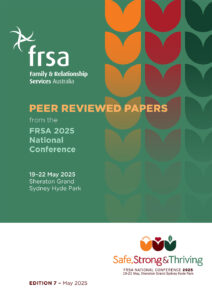 FRSA is proud to launch the seventh e-Journal of peer-reviewed papers from the annual FRSA National Conference.
FRSA is proud to launch the seventh e-Journal of peer-reviewed papers from the annual FRSA National Conference.
This e-Journal expands on the FRSA National Conference 2025 theme Safe, Strong & Thriving. This year’s e-Journal features 6 papers – 4 Articles and 2 Practice Insights papers – sitting across the following conference themes: Across the Lifecourse, the First 1000 Days, the Schooling Years, Children at the Centre, and Relationship Breakdown and Re-partnering. The FRSA Conference provides a space to share practice and research learnings and the e-Journal offers the opportunity to explore insights and learning in greater depth.

Struggling to survive – The Red Shield Report 2025
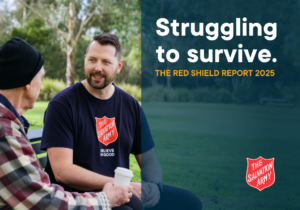 A new research report released from The Salvation Army’s Research and Outcomes Measurement team reveals the drastic actions some of Australia’s most disadvantaged community members are taking just to survive.
A new research report released from The Salvation Army’s Research and Outcomes Measurement team reveals the drastic actions some of Australia’s most disadvantaged community members are taking just to survive.
Each year, the Salvation Army conducts research to gain a deeper understanding of the experiences of people who received support from their Doorways emergency relief services. Almost 3600 people completed the survey and shared their views about some of their life circumstance and financial struggles.
The research found that respondents were left with less than $1 per day after covering essential expenses like housing, utilities and food – not leaving much for discretionary spending. Many were living well below the poverty line and reported their financial situation had worsened in the past year. Respondents also reported using “Buy Now, Pay Later” schemes to put food on the table or buy medications. Many respondents experienced housing stress, paying a substantial proportion of their income to keep a roof over their heads.
You can download the report here.
Social Isolation and loneliness – latest AIHW data
 The Australian Institute of Health and Welfare (AIHW) has released updated data on social isolation and loneliness in Australia.
The Australian Institute of Health and Welfare (AIHW) has released updated data on social isolation and loneliness in Australia.
Social isolation (few social relationships/infrequent social contacts) and loneliness (subjective distressed feeling about a lack of social connection) can harm both mental and physical health and may affect life satisfaction.
Key points:
- Loneliness and social isolation were concerns before the COVID-19 pandemic and worsened between 2020 and 2022. Since then, most age groups have reported lower levels.
- In 2023, among those aged 25–54, males experienced more social isolation while females reported more loneliness.
- In 2023, among those aged 55–64, males experienced higher levels of both social isolation and loneliness.
eSafety research - Track, harass, repeat
The eSafety Commissioner has released research on young people and the use of tracking apps in intimate relationships.
More than 2,000 Australians aged 18 to 75 years and over were asked whether they agreed with specific harmful expectations and attitudes associated with tech-based coercive control in intimate relationships, including isolating, micro-managing and monitoring a partner.
The research found that almost one in five young adults think it’s reasonable to expect to track a romantic partner whenever they want.
While 13.6% of all participants agreed expecting to track an intimate partner whenever they wanted using location-sharing apps was reasonable, this jumped to 18.6% for 18-24-year-olds specifically.
You can access the full report – Track, harass, repeat: Investigating attitudes that normalise tech-based coercive control – here.
The use of intimate partner violence among Australia men
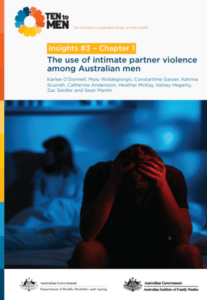 The Australian Insitute of Family Studies (AIFS) has just released research that explores the use of intimate partner violence among Australian men, including factors that may reduce the likelihood of such behaviours.
The Australian Insitute of Family Studies (AIFS) has just released research that explores the use of intimate partner violence among Australian men, including factors that may reduce the likelihood of such behaviours.
The data from Ten to Men – AIFS’ longitudinal study of boys and men – is the first national estimate of male intimate partner violence perpetration in Australia.
The research found that more than 1 in 3 Australian men (35%) aged 18-65 years have used intimate partner violence in their lifetime, with an estimated 120,000 men nationally each year starting to use it for the first time.
When first surveyed in 2013-14 around 1 in 4 men reported ever having used intimate partner violence, with this number increasing to 1 in 3, from the same cohort of men, by 2022. The cumulative nature of this data, over a lifetime, provides critical insight into the number of men who start using intimate partner violence for the first time.
The study found high levels of social support and high levels of paternal affection both reduced the likelihood of men using intimate partner violence.
Men who reported high levels of social support ‘all of the time’ were 26% less likely to report using intimate partner violence. Men who felt strongly that they had a quality relationship with a father or father figure during childhood, marked with affection, were 48% less likely to report ever having used intimate partner violence.
You can read AIFS’ report here.
Building a Secure Future Report
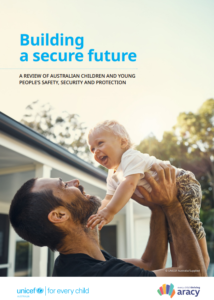 The third paper in ARACY’s the Australian Children’s Wellbeing Index series is now available.
The third paper in ARACY’s the Australian Children’s Wellbeing Index series is now available.
The series tracks what matters most to children and young people, incorporating their voices and examining emerging issues. This paper focuses on the “Valued, loved and safe” domain.
Where is Australia doing well?
- The proportion of children concerned about family conflict halved between 2007 and 2020
- Child protection notifications have decreased steadily since 2021
- Rates of children aged 10-14 under youth justice or detention decreased in the year’s leading up to 2020
- The rate of young people with high levels of concern about bullying has almost halved since 2007.
Where is Australia lagging:
- 3 in 5 Australians aged 16 to 24 years have experienced some form of maltreatment
- 1 in 4 Australians aged 16 to 24 years have experienced child sexual abuse
- Australia has one of the highest bullying rates compared with other OECD countries
- The minimum age of criminal responsibility is 10 in all states and territories except the ACT
- Aboriginal and Torres Strait Islander children are 10 times as likely to be placed in out of home care.
You can access ARACY’s full report here.

Shadow Ministry announced
On 28 May 2025 the Hon Sussan Ley MP, Leader of the Opposition, announced the Shadow Ministry.
The shadow Attorney-General is Mr Julian Leeser MP. The shadow Minister for Social Services is Senator Kerrynne Liddle.
The Shadow Ministry list is available here.
Weaponising Child Support – Ombudsman report released
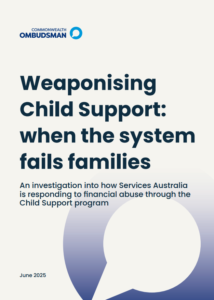 The report from an investigation by the Commonwealth Ombudsman released on 3 June found Services Australia is not doing enough to identify and respond to financial abuse through the Child Support program. This financial abuse is commonly referred to as ‘the weaponisation of Child Support’.
The report from an investigation by the Commonwealth Ombudsman released on 3 June found Services Australia is not doing enough to identify and respond to financial abuse through the Child Support program. This financial abuse is commonly referred to as ‘the weaponisation of Child Support’.
The report found Services Australia’s actions were either unfair or unreasonable in addressing widespread manipulation and weaponisation of Child Support. The investigation found that Services Australia lacked policies, strategies and training to be able to proactively identify, monitor and respond to cases of financial abuse through Child Support.
The Ombudsman made 8 recommendations, including that Services Australia more effectively enforce payment of Child Support and comprehensively review their processes, and the Government introduce a Bill to amend the law to address limitations that impede Services Australia enforcement action, fetter information sharing within Services Australia, and require survivors of abuse to disclose sensitive information to their former partner.
You can read the report – Weaponising Child Support: when the system fails families – here.
Changes to the Family Law Act from June 2025 - webinar recordings
The Attorney-General’s Department and the Family Law Pathways Network recently facilitated a series of webinars on the Family Law Amendment Act 2024, in the lead up to the commencement of important changes to the property framework and other key provisions on 10 June 2025. Recordings of those webinars can be accessed by clicking on the links below.
- Webinar 1: overview of Family Law Amendment Act 2024: National FLPN Webinar 1 of 3: ‘Overview of changes to the Family Law Act: from June 2025’
- Webinar 2: focus on dispute resolution National FLPN Webinar 2 of 3: ‘Overview of changes to the Family Law Act’
- Webinar 3: focus on legal practice: National FLPN Webinar 3 of 3: ‘Overview of changes to the Family Law Act’
Delivering quality care more efficiently – consultation closing soon!
The Productivity Commission’s consultation on the second phase of its inquiry into delivering quality care more efficiently closes 11:59pm Friday 6 June.
The Commission is inquiring into how we can ensure a more sustainable and productive care and support sector that delivers better outcomes and high-quality services in areas such as health, aged care, community services, veteran’s services, services for people with disability, and early education and care.
This phase of the inquiry invites feedback on three policy reform areas via a short questionnaire:
- Reform of quality and safety regulation to support a more cohesive care economy
- Embed collaborative commissioning to increase the integration of care services
- A national framework to support government investment in prevention.
More information about the inquiry and this consultation phase is available on the Productivity Commission website.

National Reconciliation Week
National Reconciliation Week (NRW) was on 27 May to 3 June. This year’s theme, Bridging Now to Next, reflects the ongoing connection between past, present and future. Bridging Now to Next calls on all Australians to step forward together, to look ahead and continue the push forward as past lessons guide us.
See how FRSA Members commemorated the week:
- Livable held a NRW event which included a Welcome to Country from Aunty Midge and a performance from McAuley Catholic College’s Aboriginal Contemporary Dance Troupe.
- Sora Community Services shared what their staff believe ‘reconciliation’ means to them.
- Staff from Kyabra Community Association Inc’s Moreton Bay office attended a NRW event held at Kallangur Neighbourhood Centre. Their Runcorn office held an event for the week and were treated to a didgeridoo demonstration by Lionel Cubby, who explained animal sounds and story telling through the didgeridoo.
- Lutheran Care staff including representatives from their Reconciliation Action Plan committee attended Reconciliation South Australia’s annual National Reconciliation Week Breakfast.
- Communicare team members attended the Reconciliation Western Australia breakfast both in person and online at Walyalup Fremantle.
- OzChild asked their team how they would commit to being a courageous voice for change to advance reconciliation, and bridge now to next.
- Uniting Communities also attended the Reconciliation South Australia’s National Reconciliation Week Breakfast. Co-chair of their Reconciliation Action Plan Committee, Aja, shared: “The road to reconciliation remains long, as reflections from Professor Jackie Huggins and Hon Kyam Maher MLC reinforced. But with the support, passion and commitment of both Aboriginal and Torres Strait Islander and non-Aboriginal people working together, we will continue to push for progress.”
- Anglicare WA shared a video with their Aboriginal Service Strategy General Manager, Jarred Wall, who gave a breakdown of what the week is about and what events were on during the week. Anglicare WA also took part in this year’s Reconciliation Western Australia’s street banners, featuring artwork by local Noongar artist Darryl Dempster.
- Catholic Care Western Sydney and the Blue Mountains highlighted their work with The Shed, a space for First Nations people to connect, find support, access health services, and have a yarn with their mob.
- Parkerville Children and Youth Care’s Reconciliation Action Plan Committee also attended the NRW Breakfast at the Walyalup. The organisation also took part in this year’s Reconciliation Western Australia’s street banners.
- CatholicCare Tasmania’s Family and Relationships Team attended the No 34 Aboriginal Health Service Reconciliation Week Expo in Ulverstone.
- CatholicCare Wilcannia-Forbes held a Reconciliation Community Gathering in Forbes.
- Better Place Australia staff heard from guest speaker, Uncle James Williams (Wakka Wakka Murri), during a special lunchtime learning session.
- Baptist Care SA held a community event at the WestCare Centre where attendees enjoyed live music from Les Sumner, chats with the South Australian Cricket Association, arts & craft, henna, coffee, and a BBQ lunch.
- Anglicare SA took part in the Reconciliation in the West 2025 event and their staff also attended the 2025 National Reconciliation Week Breakfast, hosted by Reconciliation South Australia on Kaurna Yerta at the Adelaide Convention Centre.
- Anglicare Sydney launched their latest Reconciliation Action Plan and shared a video of Wodi Wodi and Dharawal Elder, Aunty Joyce’s story of resilience and hope. Watch the video below the photo gallery:
Drummond Street Services win at Victorian Pride Awards
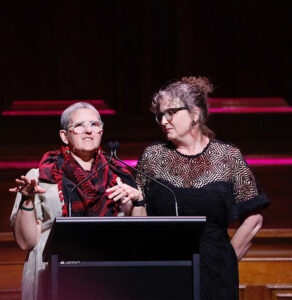 Last week Drummond Street Services was awarded the Workplace Inclusion Award at the 11th Victorian Pride Awards.
Last week Drummond Street Services was awarded the Workplace Inclusion Award at the 11th Victorian Pride Awards.
The organisation has been supporting LGBTIQA+ communities for over fifty years, with increasing numbers of LGBTIQA+ programs including Queerspace, queer mentoring programs and qhub.
Drummond Street Services said, “We are commit to affirmative employment and acknowledge that better outcomes are possible when workforce and programming reflect the diverse communities we serve.”
The Victorian Pride Awards is the states’ premier event which recognises, highlights and celebrates the work of a diverse range of organisations and individuals, that benefits and unites our Victorian LGBTIQA+ communities.
Congratulations to the Drummond Street Services team!
Relationships Australia Victoria training opportunities
Relationships Australia Victoria’s Centre for Learning and Innovation is offering the following workshops and webinars in June and July:
- Webinar: Making Space for Peacekeeping – What Can We Learn from Mediation in Remote Communities, 12 June 2025
- Webinar: What Works for Men? Engaging Men in Prevention, 16 July 2025
- Hearing Children’s Voices in Family Law Disputes – For Independent Children’s Lawyers, 17 July 2025
- Single Session Contact in Online Therapeutic Work, 23 July 2025
- Advanced Mediator – Practicum Certificate, 24, 31 July and 7, 14 August 2025

Research: Perspectives on Healthcare Support for the Sexual Health and Wellbeing of Individuals with Neurodevelopmental Disability
Researchers from the Australian Catholic University are seeking support in recruiting families and/or caregivers of individuals with neurodevelopmental disabilities to partake in an online interview.
The research project aims to explore the perspectives of family members and/or carers perspective of the support of sexual health and well-being of individuals with neurodevelopmental disability.
Click here to find out how to get involved or contact Dr Claire Lynch at Claire.lynch@acu.edu for more information.
10th anniversary of the Digital Technology in the Not-for-Profit Sector Survey
 First launched in 2015, the annual Digital Technology in the NFP Sector survey has grown to become a bastion of evidence-based advocacy, helping ensure the sector’s technology needs are seen, understood and acted upon. It provides the most comprehensive picture of how not-for-profits across Australia and New Zealand are using technology – what’s working, what’s holding them back, and where support is still falling short.
First launched in 2015, the annual Digital Technology in the NFP Sector survey has grown to become a bastion of evidence-based advocacy, helping ensure the sector’s technology needs are seen, understood and acted upon. It provides the most comprehensive picture of how not-for-profits across Australia and New Zealand are using technology – what’s working, what’s holding them back, and where support is still falling short.
The report based on the findings is considered “ground truth” and is regularly used by government, corporate philanthropy and peak bodies to inform policy, direct funding, and drive better digital outcomes for the sector. As demand for data-driven insight continues to grow, your voice is more critical than ever.
Expression of Interest – Safe and Supported Aboriginal and Torres Strait Islander Leadership Group
Safe and Supported: The National Framework for Protecting Australia’s Children 2021–31 is a national policy framework to enhance the safety and wellbeing of children and young people across Australia.
It is the main national policy framework focused on reducing the overrepresentation of Aboriginal and Torres Strait Islander children and young people in Out of Home Care.
It is a formal shared decision-making partnership between the Australian, State and Territory Governments and an Aboriginal and Torres Strait Islander Leadership Group which aims to improve law, policy and practice in child protection so we can ensure that children and young people reach their full potential by growing up safe and strong.
As a result of a vacancy, SNAICC is seeking expressions of interest for an independent expert member to join the Leadership Group.
It leads and oversees implementation of actions impacting on Aboriginal and Torres Strait Islander children and young people through shared decision-making with governments under Safe and Supported at a range of levels, including Ministers and department officials.
If you are an Aboriginal or Torres Strait Islander person with experience in child and family wellbeing or related sectors, and you want to be involved in supporting our children to grow up connected to their family, community, culture and Country, please fill out this form and email it to safeandsupported@snaicc.org.au by 13 June 2025.
Please email safeandsupported@snaicc.org.au if you would like further information or have any questions about the Leadership Group or process for expressing interest in becoming a member.
CHC81115 Graduate Diploma of Family Dispute Resolution – July 2025, Online
SOLUTION FOCUSED BRIEF THERAPY
THERAPLAY®: Level One & MIM
ACT
Family Counsellor | Marymead CatholicCare
Child and Youth Therapist | Marymead CatholicCare
VIC
Regional Family Dispute Resolution Practitioner (RFDRP) | Mallee Family Care
Family Dispute Resolution Practitioner (FDRP) | Mallee Family Care
NT
Financial Counsellors (Darwin, Katherine & Nhulunbuy) | Anglicare NT
If you have any events you’d like listed on the FRSA Events and Training Calendar or job vacancies you’d like listed on the FRSA Jobs Board, email Communications Officer, Vanessa Lam at communications@frsa.org.au. Please note that posting onto the FRSA website is reserved for FRSA Members only.

Universal access versus targeting of social services and welfare | Parliamentary Library, Issues & Insights article
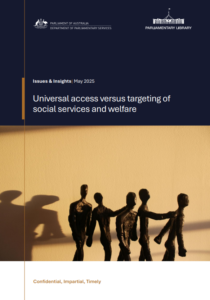 Social expenditure is under scrutiny in Australia and many other countries due to rising costs, with some arguing for reforms aimed at greater targeting of assistance to those most in need. What is the case for a more targeted welfare system versus universal arrangements?
Social expenditure is under scrutiny in Australia and many other countries due to rising costs, with some arguing for reforms aimed at greater targeting of assistance to those most in need. What is the case for a more targeted welfare system versus universal arrangements?
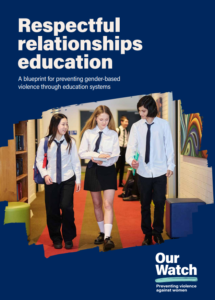 The blueprint emphasises the importance of establishing strong foundations and clear actions required to ensure schools are supported, by governments, to embed RRE to play a role in preventing gender-based violence before it starts. It shows us how we can create a violence-free future for all young Australians within schooling systems.
The blueprint emphasises the importance of establishing strong foundations and clear actions required to ensure schools are supported, by governments, to embed RRE to play a role in preventing gender-based violence before it starts. It shows us how we can create a violence-free future for all young Australians within schooling systems.
Clerks: working from home surveys | Swinburne University of Technology
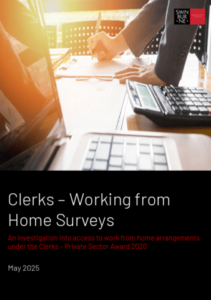 This study provides comprehensive insights into current working from home practices under the Clerks Award, highlighting significant trends, barriers and demographic differences. These findings will inform the development of relevant terms under the Clerks Award
This study provides comprehensive insights into current working from home practices under the Clerks Award, highlighting significant trends, barriers and demographic differences. These findings will inform the development of relevant terms under the Clerks Award
Bridging the gap: social work practice challenges in navigating support for families with disabilities | Children Australia
This paper explores reflections from five regional social workers about the challenges they faced supporting families who need assistance but are yet to access National Disability Insurance Scheme (NDIS) packages. It identifies key challenges for practice, including difficulties accessing disability services and lack of guidelines on navigating the NDIS application process for family services staff.
Resilience-focused approaches for school-age Australian First Nations populations: a systematic review of influential factors | Australian Journal of Rural Health
Building resilience has been identified as a key way to improve the wellbeing of children. This article reports on a systematic review of the literature on factors influencing resilience in school age (5–19 years) Australian First Nations populations. It describes how resilience is defined and operationalised, how factors identified map onto the Social and Emotional Wellbeing (SEWB) model and whether there are differences in factors depending on age and residential localities.
The promise of justice reinvestment for First Nations children and young people in Australia | Children Australia
This article introduces the concept of justice reinvestment (JR) as defined and applied in Australia by First Nations people, including as a mechanism with potential to reduce over-representation of young First Nations people in the justice system. It draws on specific examples from longer-standing JR initiatives and their implementation of JR elements.
State of the housing system: 2025 | National Housing Supply and Affordability Council
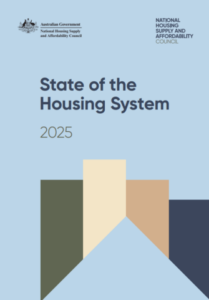 The report details Australia’s current housing demand, supply and affordability conditions, and the expectations for these over the coming years. It finds that housing affordability continued to deteriorate in 2024, with worsening trends across most capital cities and regional areas. It makes 15 policy recommendations in five key policy areas.
The report details Australia’s current housing demand, supply and affordability conditions, and the expectations for these over the coming years. It finds that housing affordability continued to deteriorate in 2024, with worsening trends across most capital cities and regional areas. It makes 15 policy recommendations in five key policy areas.
Australian charities report | Medical Journal of Australia
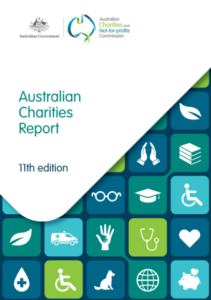 This report provides an annual analysis of the Australian registered charities sector. It focuses on key indicators including revenue, expenses, donations, volunteers and employees. The holistic data set confirms the importance of the sector to the Australian economy; the sector continues to grow year on year.
This report provides an annual analysis of the Australian registered charities sector. It focuses on key indicators including revenue, expenses, donations, volunteers and employees. The holistic data set confirms the importance of the sector to the Australian economy; the sector continues to grow year on year.
Theorising family and domestic violence work: what is the work and who does it? | Flinders University
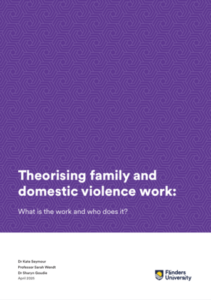 This report describes research exploring the domestic and family violence workforce in Australia and the work that it undertakes. It focuses specifically on how the work is done and experienced, why it is done in particular ways, and the structural and organisational contexts that shape this work; with the aim of informing workforce development strategies.
This report describes research exploring the domestic and family violence workforce in Australia and the work that it undertakes. It focuses specifically on how the work is done and experienced, why it is done in particular ways, and the structural and organisational contexts that shape this work; with the aim of informing workforce development strategies.
Measuring outcomes experienced by users of community services | Swinburne University of Technology
This article reports on the development and testing of a framework for measuring outcomes for the human services sector. The process included action research methods and produced the Community Services Outcomes Tree and a survey measurement tool.
Commonwealth public sector gender equality scorecard | Workplace Gender Equality Agency
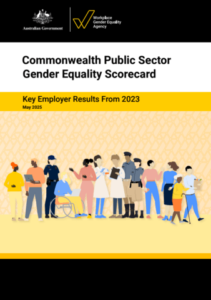 The scorecard presents the individual gender pay gaps for 120 Commonwealth public sector employers and two corporate groups. The report also contains analysis of the employer reports against each of the six gender equality indicators for 2023. The results indicate that Commonwealth public sector employers have lower gender pay gaps than their private sector counterparts.
The scorecard presents the individual gender pay gaps for 120 Commonwealth public sector employers and two corporate groups. The report also contains analysis of the employer reports against each of the six gender equality indicators for 2023. The results indicate that Commonwealth public sector employers have lower gender pay gaps than their private sector counterparts.
Shifting focus to adolescent wellbeing and inclusive participation in the digital age | Medical Journal of Australia
This paper highlights the need for a holistic approach to digital health that promotes adolescent wellbeing across multiple domains. It argues specific policy changes, multisectoral collaboration and working in direct partnership with adolescents to create safe, supportive and equitable digital environments are required to address the digital determinants of health in Australia.
Want to submit something to the FRSA eBulletin?
If you have an news item or event that you would like to be featured in a future eBulletin please submit your announcement via the form below or email communications@frsa.org.au with the subject “FRSA eBulletin submission”.
Please note FRSA members receive priority for items posted in the eBulletin. And to keep information current, relevant and useful, submissions will not be repeated from week to week.
Subscribe
Subscribe to receive future eBulletin editions directly to your inbox!









